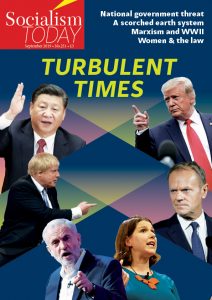Across Europe we have seen a resurgent right making electoral gains. In the US, white supremacists have grown increasingly confident after the election of the right-populist Donald Trump. A new book aims to explain this phenomenon but, PAULA MITCHELL argues, a materialist approach is necessary to understand the alt-right, its roots, limits and perspectives.
The Alt-Right: what everyone needs to know
By George Hawley
Published by Oxford University Press, 2019, £10.99
The US alt-right came to prominence during Donald Trump’s 2016 election campaign. Steve Bannon, former editor of alt-right website Breitbart, was chief executive of Trump’s presidential campaign and, latterly, White House chief strategist. Bannon and others linked up with the organisers of the Football Lads Alliance in Britain, pledging money to build a new street movement.
Read more A rising sense of panic is gripping the strategists of British capitalism as the 31 October Brexit deadline draws ever closer. “Britain’s exit from the European Union without a withdrawal deal would be an unequivocal national calamity”, the Guardian newspaper editorialised (16 August). The usually more soberly-toned Financial Times has also used similar phrases.
A rising sense of panic is gripping the strategists of British capitalism as the 31 October Brexit deadline draws ever closer. “Britain’s exit from the European Union without a withdrawal deal would be an unequivocal national calamity”, the Guardian newspaper editorialised (16 August). The usually more soberly-toned Financial Times has also used similar phrases.